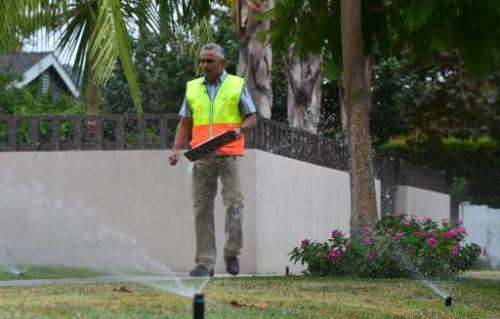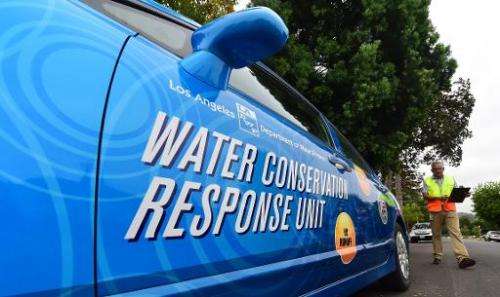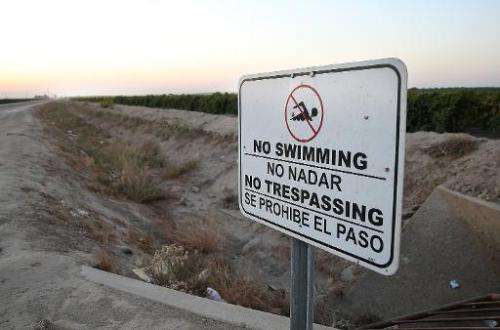Water police on patrol in drought-scarred Los Angeles

Los Angeles isn't the world's wettest city at the best of times. But a record drought has triggered extra measures—now including "water police" checking on over-zealous sprinkler users and the like.
The Water Conservation Response Unit is a five-strong team from LA's Department of Water and Power utility, who aim to "educate customers about the importance of practicing water conservation."
The unit's director Enrique Silva patrols the sprawling metropolis's neighborhoods in an ocean-blue car, looking for people wasting water.
"We will look for people irrigating on the wrong day, especially the one thing we're looking for is water running in the street, run-off," he told AFP.
"It can be for any different reason, usually from irrigation being on too long."
California is in the grip of its third year of severe drought, the worst in decades, threatening to drain underground aquifers and leaving the taps of some 40 million people to run dry.
Los Angeles has introduced measures to incite people to save water, including giving money to those who replace their lawns with plants more adapted to desert climes and less water-hungry, such as cacti.
But given the urgency, the DWP has also slapped restrictions on users including banning householders from watering their gardens every day or from doing so on the same spot for more than eight minutes, among others.

Sprinklers can't be used in sunlight hours, when evaporation wastes a lot of the water before it can moisten plants or grass.
On patrol, when he finds a lawn which is still wet or puddles on the sidewalk or road, Silva takes photos as evidence of a violation. Back in his office, he writes an official warning letter to the homeowner.
Whistle-blowing neighbors
"We're more in an educational phase. We feel that people understand that we are in a drought and we feel that if people know the rules, they'll comply with them," said Silva.
"Many people who are watering on the wrong days might not realize that they're only allowed to water three times a week. So by sending them a letter, we let them know what the rules are and what the potential fines (of up to $100) are if they don't comply."
But in a country where people are proud of their green lawns, other measures are also being considered, including increasing the price of water in line with its scarcity, from year to year.
"Maybe in years where there is a lot water, the water can be less expensive," said Stephanie Pincetl, director of the California Center for Sustainable Communities at the University of California Los Angeles (UCLA).
"But in years that are becoming more normal where there is less water, that water is very expensive. Because watering a lawn is not a necessity for human wellbeing," she added.

She said that each householder should have two water meters: one for inside the house, on a cheaper rate, for necessary things like food and hygiene, and another more expensive one for gardens and pools.
Pending more substantial measures, Silva can count on a phenomenon which is becoming increasingly common: neighbors telling on each other.
"There are two houses that I see them, every day," local resident Mahmoud Jahedmanesh tells the water patroller, whose car is emblazoned with an email address people can write to report their neighbors.
"When I see them every day they're watering their lawn, after they were told to conserve water and they don't—maybe they should just give them a little notice or something," said Jahedmanesh.
On this occasion, those at fault will only get a warning letter.
But if the drought persists into the coming fall and winter, the next phase will come into force, with fines raining down on those who waste water in Los Angeles.
© 2014 AFP
















